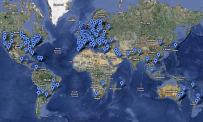 The European Commission is not always known for its accessibility and openness to new ideas, but it should now be listening to the responses to two major consultations. First, a group of experts submitted their thoughts on the cultural and creative industries as part of the Open Method of Coordination Groups. Second, responses came in from (not quite) across the continent commenting on the Green Paper on the Culture and Creative Industries.
The European Commission is not always known for its accessibility and openness to new ideas, but it should now be listening to the responses to two major consultations. First, a group of experts submitted their thoughts on the cultural and creative industries as part of the Open Method of Coordination Groups. Second, responses came in from (not quite) across the continent commenting on the Green Paper on the Culture and Creative Industries.
The Open Method of Coordination is an intergovernmental and informal means of governance that runs on the principle that having international peers congratulate you on what you’re doing well, and shame you about what you are doing badly, will create change. There’s a more comprehensible run down of its function here.
The final reports have just been released from the four working groups, each of which released a separate report. These cover the mobility of culture professionals, the synergies between culture and education, museum activities, and the cultural and creative industries. The latter is most interesting and provides a useful summary of the big issues affecting the creative industries today. Recommendations include the well-worn “use best practices and statistics to demonstrate the importance and economic value of the CCIs” and the need to come up with a clear working definition of the sector. The report addresses agendas around skills, rewarding ventures within the sector, and emphasises the need to map the existing industries, a project potentially led by a new observatory. Full reports here.
Some of the ideas are very original, but it is the fundamental understanding of the sector that these reports outline that should be most useful for any policymaker. The reports were published in June and we are waiting to see whether they have any impact, or get lost in the Brussels fog.
The second big consultation news is the publication of submissions to the Green Paper on the Culture and Creative Industries. Some responses are interesting, some predictable, and some respondents appeared to have read a different Green Paper to us. Here are some of the key themes and selected highlights:
- Unsurprisingly, everyone welcomed the green paper – it seems a standard opening to the statements. Submissions expressed ‘satisfaction’ (Govt of Poland), ‘welcomed’ it (Swedish Arts Council), or said that they “agree with the main arguments” (Arts Council England).
- Many submissions reminded the EU of the unique features of the sector, a key theme of the OMC report too. For instance, they appreciated the cross cutting nature of the creative and cultural industries – and so the importance of linking them with other sectors and policies (Swedish Arts Council; Govt of Estonia)
- The Sport Institute of Finland, appropriately, raises an issue about the definition of the creative and cultural industries and who should be included. Their work is included in Finnish definitions, but is probably not included in European ones. Is there a need to harmonise the definition across member states?
- Amidst the support, there were comparatively few practical suggestions for new initiatives. The Dutch Creative Residency Network came up with some, including a suggestion for a new digital creative matchmaking service. Their submission frankly admits that “most creative companies are not the most organized businesses”.
- And our own response, where amongst other points, we emphasised that European institutions should ensure their work complements, rather than challenges, existing regional, national and local developments. It can do this by creating and supporting platforms and structures that are transnational. For an example of what we mean by this, see the next news item.
It’s also interesting to note which countries’ governments are most engaged with the agenda. Those whose public bodies made most submissions were Sweden (12) closely followed by Germany (11) and then the UK (7). There were no submissions from public bodies in Cyprus, Greece, Hungary, Lithuania, Luxembourg, Malta, Slovakia and Slovenia. We hope that the opinions of smaller countries and those from South East Europe are being heard in other ways. Also, we note the absence in the submissions of evidence and research to back up views – often responses relied on quoting the Commission’s own statistics back at them. We think ‘new research’ should be another recommendation, and they should give special consideration to promising projects on the cultural and creative industries across the whole of the EU, such as EDUCULT’s proposed research into the different resources given towards cultural education (more on that here).
Source : Ecce, European centre for creative economy.
Filed under: Evénements, Expériences, Gouvernances, Ingénieries, Politiques culturelles, Industries créatives, Politique européenne, Politiques culturelles


Recent comments